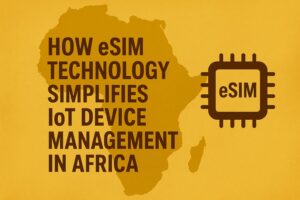 Introduction
Introduction
How eSIM Technology Simplifies IoT Device Management in Africa. The Internet of Things (IoT) is rapidly reshaping industries across Africa. From agriculture and logistics to healthcare and utilities, connected devices are transforming how businesses and governments operate. Yet, behind the promise of IoT lies a significant challenge: how to manage, provision, and maintain thousands or even millions of devices spread across vast geographies with diverse network environments.
This is where embedded SIM (eSIM) technology comes in. By eliminating the need for physical SIM card swaps and enabling remote provisioning, eSIM dramatically simplifies IoT device management. As highlighted in the article “How eSIM Technology Simplifies IoT Device Management”, eSIM is fast becoming the backbone of scalable IoT solutions worldwide.
At Kingfin, we are proud to be at the forefront of this transformation as a leading eSIM and IoT solutions distributor in Africa, enabling organizations to unlock the full potential of IoT.
What is eSIM and Why It Matters for IoT
An eSIM (embedded SIM) is a small, programmable chip built directly into an IoT device. Unlike traditional SIM cards that must be physically inserted, removed, or replaced, an eSIM can be remotely programmed to connect to different mobile networks.
For IoT deployments, this flexibility is crucial. Consider a logistics company deploying thousands of smart trackers across Kenya, Ethiopia, and Tanzania. Instead of relying on multiple SIM cards from different carriers, eSIM allows these devices to switch seamlessly between networks, all through software updates.
This capability reduces operational friction and ensures consistent connectivity across regions—a major advantage in Africa’s diverse telecom landscape.
Key Challenges in IoT Device Management
IoT deployments often face hurdles that slow adoption and increase costs. Some of the most pressing challenges include:
- Connectivity fragmentation: Different regions and operators require different SIMs, making cross-border IoT deployments difficult.
- Physical SIM replacements: When a SIM card becomes obsolete or needs an upgrade, replacing it in thousands of deployed devices is time-consuming and costly—especially for remote or hard-to-reach sites.
- Security concerns: Traditional SIMs can be tampered with, stolen, or cloned, posing risks to IoT networks.
- Scaling complexity: Managing device lifecycles—from provisioning and activation to updates and decommissioning—becomes overwhelming without automation and remote capabilities.
How eSIM Simplifies IoT Device Management
According to IoT For All’s article on eSIM, eSIM provides a robust solution to these challenges:
- Remote Provisioning and Updates
With eSIM, devices can be provisioned over-the-air. This means businesses can activate, update, or reassign network profiles without sending technicians into the field. - Streamlined Global Connectivity
Instead of juggling multiple SIM types for different regions, eSIM enables seamless global coverage with one embedded chip. - Reduced Operational Costs
Eliminating manual SIM replacements cuts down labor, travel, and downtime costs. Organizations can scale faster and more affordably. - Stronger Security and Lifecycle Management
eSIM supports advanced encryption and remote monitoring, making IoT deployments more secure while giving enterprises more control over device lifecycles.
These benefits are particularly valuable in Africa, where IoT deployments often span vast geographies with limited infrastructure.
The African Context: Why eSIM is a Game-Changer
Africa is experiencing a surge in IoT adoption. Agriculture is using smart sensors to boost yields, logistics companies are tracking fleets in real time, healthcare providers are deploying connected medical devices, and utilities are rolling out smart meters to improve efficiency.
However, unique regional challenges have slowed progress:
- Fragmented mobile networks across borders.
- Remote rural areas with limited infrastructure.
- High operational costs associated with maintaining devices.
eSIM directly addresses these barriers by offering flexible connectivity, remote provisioning, and lower lifecycle costs. For example:
- Smart agriculture: Farmers can use soil sensors and weather stations with eSIM-enabled connectivity to ensure reliable updates across shifting coverage zones.
- Logistics and transport: eSIM allows fleet trackers to seamlessly switch networks as trucks cross national borders.
- Healthcare: Connected medical devices can remain active and secure in both urban hospitals and rural clinics without manual SIM swaps.
For organizations facing these challenges, Kingfin provides not only connectivity but also IoT device provisioning and lifecycle management to ensure deployments succeed across diverse African environments.
Kingfin’s Role as an eSIM & IoT Solutions Distributor in Africa
At Kingfin, we understand the unique challenges of deploying IoT in Africa. As a trusted IoT distributor and solutions partner, we provide enterprises, governments, and industries with the tools they need to succeed in an increasingly connected world.
One of our flagship offerings is IoT device provisioning. This ensures your devices are securely connected, managed, and maintained throughout their lifecycle. To learn more, visit our IoT Device Provisioning page.
Beyond provisioning, Kingfin also offers a comprehensive IoT solutions portfolio, covering connectivity, hardware supply, and training. Whether you’re deploying IoT kits, building custom applications, or scaling across multiple markets, Kingfin ensures your IoT strategy is future-ready.
Benefits of Partnering with Kingfin for eSIM IoT Solutions
When organizations partner with Kingfin, they gain more than technology they gain a strategic partner committed to making IoT work in Africa. Benefits include:
- Local expertise with global standards: Deep understanding of African market realities combined with partnerships with leading global providers.
- Scalability: Whether piloting a few hundred devices or deploying tens of thousands, Kingfin ensures seamless scale-up.
- Cost efficiency: Remote provisioning and eSIM-based solutions reduce overhead and operational costs.
- Security and compliance: Robust provisioning processes ensure IoT devices remain secure and compliant throughout their lifecycle.
- Dedicated support: We back our solutions with strong customer service and technical support, helping organizations succeed long-term.
We also provide IoT hardware and development kits as well as training and capacity building programs tailored to African enterprises, equipping teams to manage and innovate with IoT.
Conclusion & Call-to-Action
eSIM technology is revolutionizing IoT device management worldwide, and its impact in Africa is even more profound. By enabling remote provisioning, global connectivity, and enhanced security, eSIM is solving the very challenges that have historically slowed IoT adoption in the region.
At Kingfin, we are proud to lead this transformation as a key eSIM and IoT distributor in Africa. Whether you are an enterprise scaling up IoT deployments, a government agency rolling out smart infrastructure, or an industry innovator seeking reliable connectivity, Kingfin has the expertise and solutions to help you succeed.
👉 Learn more about our IoT Device Provisioning services or connect with our team through our contact page to start your IoT journey with Kingfin today.

